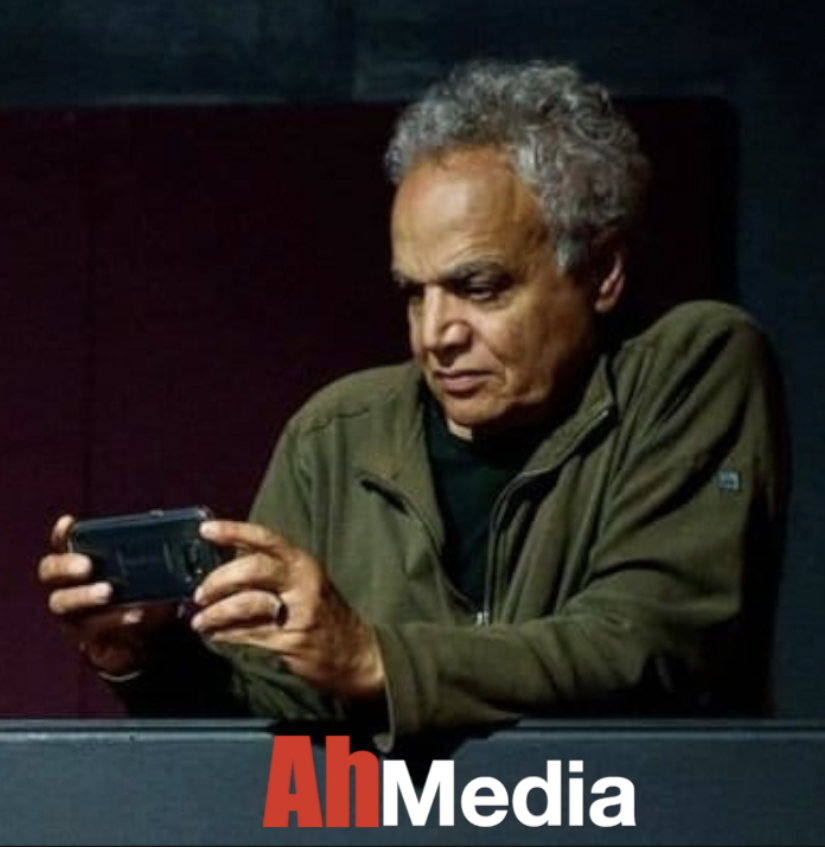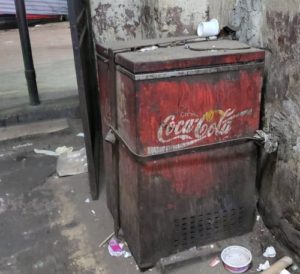
I left Egypt 40 years ago, finished school, my military, and my money, still no job. Besides, I haven’t found the women that our lover guru and singer Abed el Halim Hafez told us about, with her silky hair, with a name like Angie. They say you can take an Egyptian out of Egypt, but you can’t take Egypt out of an Egyptian. I still visit Egypt every now and then, this was one of my visit after the Jan 25th revolution, it wasn’t easy after all these years. I was warned about political climates in Egypt, martial law, forced disappearance, political prisoners, and the treatment of journalists and media.
However, through all these years, I have missed out on lots of family funerals.
Before I left to avoid any suspicion. I needed to be on an EVR, status (Egypt Visit Ready),. First, I suspended my social media, Facebook. Twitter, Instagram, Linked. I got another account, a dull one with a few political posts, more puppies, food, traveling, and Pyramids. I unfriended my political activists and visited a few porno sites for good measurements. The flight was long and tedious, nine hours layover at Paris Airport, the most boring airport I have been to. On the same flight boarding a Somali family often,. We had a great conversation and a father who never missed a prayer on the flight After 24 hours of flight. Landing at Egyptian airport and going through security with lots of trepidations and concerns.” reason of your visit?” the security officer asked, My brother passed away,. “I’m so sorry; welcome home enjoys your stay,” replied. Once I got out of the airport, a young policeman with his new uniform and slowly approached me. His raw demeanor was of a villager lost in a big city. Ahlan and welcome home, Sir, he said with a childish smile. I was worried, not ready for a police confrontation. I sat down on a bench, waiting for my ride. The young policeman came and sat beside me and started a friendly conversation! ..coming from abroad, and how is your flight. He asked. How is the security here, officer? I joked! It is Tamam!! (Ok) don’t worry Sir! he casually replied! ..as I was about to leave for my ride, the policeman looked at me and said are you leaving, we aren’t done yet!! his face said it all, “he needed a “Bakshish” a gratuity!” my ride told me. I haven’t sharpened my Egyptian satellites and intricacies. I tried to pull some Egyptian money that I keep all these years” He whispered not right here Ya Basha (Sir), point to a nearby behind a fence for the pleasant transaction! Driving from the airport through Cairo late at night after being away for some times, the fresh air, rarity, of empty street, blocked by billboards of international soccer player Mohamed Saleh, and Phones companies ads covering the landscape. Different aesthetics and different logic all around you! Police security everywhere, checkpoints. People have to surrender their private phones and passwords, monitor their social media life. Police surrounding churches outside and Mukhabarats (private guards) embedded inside mosques.
Post-revolution and under military rule, el-Sisi is bringing the worst of Egypt and Egyptians. People living in a social bobble protecting themselves from their harsh reality. Cab drivers aren’t as cheerful and eager to share their stories. GPS and Uber are killing the conversation. Egyptians who are known for giving their unsolicited opinions on wimps, and when you ask them for the direction, you got an opinion. All disappeared under grime faces and suspicious looks, people in the street, escaping in their smartphones, taking refuge in virtual realities. Egyptian street social life and spontaneity are dead. People lost their ability to trust each other, everyone is a suspect. Street noise, crowds, pollution, and smogs suffocating the 1000 minarets of the old city, Cairo. Stray dogs and cats jostling competing with people and cars for space. Shop Owners are uninterested, you don’t know if they’re open or close, losing hope of any transaction. As if the polluted air wasn’t enough. In Egypt, everybody in Egypt smokes, shopkeepers, traffic police, teachers in school, people on buses, waiters/es in restaurants, and even doctors in hospitals, all smoke.
There are about 20 million people live in Cairo, as many mosques as cafes, they call for prayer every few hours. However, most people taking refuge in cafes, sipping tea, watching football games or playing backgammon, avoiding casual conversations, and ignoring street peddlers calling for their products, vegetable sellers outline the beauty of his Tomatoes, Potatoes, and watermelons. Street peddlers, their carts loaded with big stacks of watermelons, will go around chanting their admiring jingles describing the beauty of their Watermelons. ‘Hamar we Halawah’ reddish and sweetness, or Ya Gammr, ya Gamer; Oh Embers, like embers. The confident watermelon peddler will chant Ala Elskinah Ya Helwah, challenging anyone to cut his watermelons and taste them. Now they have trucks and megaphones.
Egypt Sidewalks have always been vibrant places that reflect old culture and commerce. A place where you find people selling books, cheap cloth, Gums, Napkins, posters, watches, anything, and everything is. In this place, mummies and CocaCola, (modern mummies) were once sold. The sidewalk has its own vibrant life and culture of its own. Egyptians use them as an expansive landscape of their own homes, a refuge from their own harsh realities. Watching women dressed in their traditional clothes and hijab buying lingerie in public is a confusing cultural experience for the untrained eye. On a sidewalk lingerie shop in the city’s east of Cairo. I covered carts with colorful and fashionable Chinese-made bras and scanty underwear. Ironically, this lingerie sidewalk shop, like virtually all of them, was run by a man; women don’t sell underwear in public, but they buy them almost exclusively. Buying lingerie in public is a recent phenomenon, self-expression, and social experience. Naturally, flirting is an enormous part of the lingerie-buying bargaining game, where sexual euphemisms are not a social taboo. The lingerie carts were everywhere, surrounded by a few women in their long garments and hijab. They are sorting and holding up lingerie in their hands, confidently checking sizes and style, oblivious to the piercing public eyes. Since there is no privacy, no dressing room on the sidewalk lingerie shops. The salesman was cool, respectable, helpful conversing with a slightly full-figured woman as he casually handed her a thong as if he was giving her a Kleenex.
“That is too small,” she shrugged.
“Not at all. It is your size,” he assured her.
She smiled, steered his hands away, and continued her quest for the right-fitting undergarment.
I approached the lingerie cart and curiously asked the charming salesman about his secret.
“How do you help your customers choosing the right sizes and styles,, ?” I queried.
“I look at her waist and shoulder,” he replied in all sincerity as he demonstrated his technique on his own body.
Contemporary lingerie can be whatever the modern woman wants it to be, and women have more choices now than at any time in history. The Western woman may still buy her undergarments in secret from Victoria’s Secret in a private moment inside a store in a mall. Still, at the sidewalk lingerie market in Egypt. The confident Egyptian woman is buying her lingerie under the gaze of the public eye. This empowers and gives her the freedom to express her sexuality in such a conservative culture. At the sidewalk lingerie market, there was lingerie for all situations and intentions, including lingerie that was strapless and backless. Also offered were the sexy thong teddy, as well as a plethora of everyday bras and panties. Egypt, with all its political turmoil and anxiety, provides the woman an escape into a lingerie shopping journey to reward herself and feel good about her own body. Something which has been ignored for a long time. Now in the era of the new Prince Charming Al Sisi, the Alpha man, the conqueror of the Muslim Brotherhood invaders, women may not be able to protest in the street. Still, at least they can escape freely in a lingerie magic world. Egyptian women who burned their hijabs in Tahrir square to express their feminist MeToo movement. They need to burn their bras first to liberate themselves from sexism and subjugation of women’s bodies.
In Egypt sidewalks where I found a glimpse of hope and a sniff of Egyptian spirit. People trying to escape the madness and the neglect of the cold city, trying to hide from government hostile attitude Draconian policies. el Sisi, with his iron fist military rule.
A military man who believes that the biggest problem Egypt is facing now is the old capital of Cairo and Egyptians themselves. He has been building a utopia remote new capital that costs billions of dollars where nobody lives or can afford to live there. Building egomaniac projects for his own vanity, major bridges to nowhere, huge gigantic palaces for his wife, and his ego. Where offering no public services to speak of, people are left alone to fend for themselves, solving their own problems. Street Sidewalk where I live, police checkpoints are blocking it on both sides, no traffic going through, armed car guarding the street from imaginary intruders. The street inhabited by high-security buildings, Parliament, Prime ministry, and the Turkish embassy, where policemen with machine guns are sitting ignored by people, lost in the street landscape. Next to him, trash and cats comfortably resting undisturbed. Walked by Mahmoud shoe repair shop, a dark man with a white beard and wrinkled face that showed his age. Mohamoud, for more than 60th years, is working in a dark narrow small room,. Mahmoud sitting behind a 70-year-old machine, surrounded by old shoes, and the smell old leathers, carving his own private space, a place he can call home. “I’m the only one who left who can fix this machine,” he proudly explained. Tell me about this street and the changes you have seen through all these years. I asked him. “he Sidewalk was six, seven meters wide, we used to play soccer on it, but they cut down all trees and make it narrower to widen the street.” He explained, “ministers and high government officials used to come to My shop,” he told me. Now things are different, everything went downhill after the revolution. People don’t care anymore, no class”. He added. A stray skinny dog walking poise to get to the street corner by the big electric box, ignoring the noise street, the dog stopped were five or sex poppies came from nowhere and rushed to their mother. They started grabbing her nipples, the dog serenaded her body, time to eat. Visiting Zainab Khatoon Cafe in old Cairo, Hussein province, located at the end of a dark crooked narrow alley that is lost in rich old history and memories, Looking at the faded graffiti on walls, washed away by time and excessive peeing. The cafe is sitting in the middle of a courtyard surrounded by a 700-year-old building with Mashrabiah (windows) looking over the court. Where a servant turned princes, by name, Zeinab Khatoun once lived. This cafe reflects diversity where old and new, family and lovers, harmoniously coexist. You can see Arabs, gulf visitors in a new BMW with their traditional garbs. Women with burka mixing with women with short skirts, Nike T-shirts, people from all walks of life, enjoying themselves in a rare moment of magic. They are smoking hookahs, drinking, eating, and listening to loud music. The live bands go by around playing by each table, don’t leave until they get their gratuities. I met owner Esam Khatoon,a young chunky man full of energy. I asked him about his relationship with the cafe, “I used to work as “Shayal” a man who carries heavy lift around. I can’t read or write, so I made this brochure telling the story, for people to read,” he casually said, he ordered us some drinks and hookah, we talked, laughed the Khatoon moment.
On sidewalks where people quietly planting a tree, growing some flowers in front of their homes, shops or buildings, feeding a stray dog or a cat with little left they had. Late night. I walked in downtown Cairo; I was alone, enjoying my anonymity in the big city, aimlessly trying to lose the sorrows of the day. When you don’t care where you are going, you never get lost. In Cairo, the city that never sleeps was nervously quite, after spending the most of the night walking in the dark allies, no particular place to go, nobody to speak with, suddenly passed by Tahrir square, that a few years ago, had just witnessed the most significant event in Egyptian history, This revolution for dignity started from this square, Tahrir Square (Liberation Square). The famous square is a major public focal point in Downtown Cairo. It combines all the contrasts in Egypt, from the Egyptian Museum to the Hilton Hotel. It is surrounded by elegant buildings that were modeled as the Paris of the Nile. It also has the most significant public bus station, where thousands of Egyptians congregate every day to go to work or return home. It gained its prominence in the 19th century when another Mubarak – Ali Pasha – was commissioned by Egypt’s ruler at the time. Ismail Pasha, and charged with remodeling Cairo. And so it was named Ismailia Square. The square’s name was changed to Midan Tahrir (or Liberation Square) after the first Egyptian Revolution of 1952.
18 glorious days toppled a 30-year dictatorship, where millions of Egyptians went to the streets, took over Liberty Square, and made it their own. The echo of their chanting still resonates in my head, filling the empty square. Standing alone surrounded by those old architect buildings, for years, have been watching over the famous Tahrir square, which has been an eyewitness of significant events and turmoil for generations. Now, trapped by massive security concrete walls, blocking views, and access to traffics to the American Embassy, it isn’t just an assault on people’s rights of movement. Still, it is an assault on public aesthetics. The streetlights were tired and blurred, trash freely flying in the air, performing the last dance of the night, oblivion with no one to watch or to admire their dance. The sidewalk finally rested after a long day of pedestrian’s abuse. The stores finally retired; they lock their doors shut, cats and dogs playfully running across the street unafraid. Growing out in Egypt, as a youngster, wandering in Cairo street was therapeutic, it cleanses your soul. I crossed the empty square, reached the Nile River that cuts through the heart of the city. The fresh air, the reflection of the stars on the river surface, telling the story of broken love tails, left behind on the river bank –Quorneesh-.In Egypt, wherever it happened on Nile Qurnaish, stay on the Qurnaish!!.
A short distance, in the dark, I spotted a street cart by an old tree. The cart was tucked away next to a damaged sidewalk, a pile of prickly pear Cactus –Teen Shooky- on the top of the cart, fresh, colorful, and inviting. It’s piercing sharp pricks seem as if they are protecting themselves from late-night intruders. The sleepy owner was not in a selling mood, lying down by the cart, next to him, a tired dog both oblivious to life around them. I wasn’t sure if I should start a conversation, wondering if it is worth to wake him up. I slowly approached the cart and stood quietly, looking at the fresh prickly pears. Without uttering a word, or ask of him anything, the man got up and started, peeling the new Cactus with his bare hands. One by one started coming out of its shell, like a naked newborn. He quietly handed them to me, miraculously avoiding its sharp pricks, then the conversation, with a stranger. I kept eating as many fresh Cactus as his stories lasted. His families, his daughter’s first year in college, and of course some Egyptian bragging rights… , Egyptian soccer player, Mohamed Salah glorious goals in Liverpool, and “My wife makes the best Molokhia in Masr” the conversation went well avoiding politics and Egypt’s current state of affairs … Eventually, I realized that my stomach is full and this eating fest must end. I tried in vain telling him “Kefayah” enough, then there was always one last story to tell, and one Cactus to peel. You want to keep the evening alive, but he ran out of stories and my stomach ran out of the room, for any more Cactus! He quietly counted the peels that indicate how many Cactus I ate. I paid him well enough to stopped counting and walked away, leaving my new friend alone, wondering if I will ever see him again.
Ahmed Tharwat
Host and producer of an Arab American TV show in the state, BelAhdan with Ahmed.. writes for local and international publications; StarTribune, Slate, Salon, appears on Public Radio, and PBS TV, FoxNews, a public speaker trying to tell hyphenated Americans stories… working on my film documentary “The Coptic Grave”..
The streetlights were tired and blurred, trash freely flying in the air, performing the last dance of the night, oblivion with no one to watch or to admire their dance. The sidewalk finally rested after a long day of pedestrian’s abuse.
The streetlights were tired and blurred, trash freely flying in the air, performing the last dance of the night, oblivion with no one to watch or to admire their dance. The sidewalk finally rested after a long day of pedestrian’s abuse.


